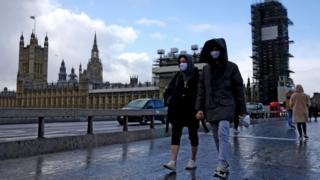Coronavirus: Decision on 'virtual' Parliament due
 Image copyright
AFP/Getty Images
Image copyright
AFP/Getty Images
A decision on whether MPs can take part in some Commons business virtually is due to be made later.
It is understood the House of Commons Commission, which is responsible for the administration and services of the Commons, is highly likely to nod through the plan.
It would mean that MPs could take part in question sessions and statements via video link after recess.
MPs would have to approve the changes next week.
The main proposal would see some proceedings take place through video link, and broadcast live.
Parliament is due to return on 21 April to debate the coronavirus outbreak and other matters.
Earlier this week, Speaker Sir Lindsay Hoyle said plans for a "virtual" Parliament were "progressing well".
Conservative MP Stephen Crabb, who is the Commons' Welsh Affairs select committee chairman, said a transition to a "virtual" Parliament "isn't so significant" as many MPs "are well used to working from home".
"We don't necessarily think this lockdown is going to end in the next few days or even few weeks," he told the BBC.
"So we don't want to let this period pass without the government really being questioned on very, very serious and challenging issues - and that's what we need to be able to do."
'Inevitable challenges'
There was a risk in convening Parliament again as it is a small place, he said, and it would mean Parliamentary staff would also have to return.
"Any hasty decision to bring back Parliament needs to be considered from the point of view of staff... not just what the MPs might want," he said.
Mr Crabb said it was "inevitable" that there were "a few teething challenges" when chairing a committee meeting via video conferencing.
"You have 10 other people in the room all wanting to perhaps talk at the same time - it's much easier to chair that when you're physically in the same space," he said.
He added that the virus "will force us to look at reforms with more urgency" in an "old-fashioned" Parliament - such as electronic voting or video conferencing.
'Hold government to account'
Meanwhile, SNP Westminster leader Ian Blackford is part of a cross-party group of MPs who have been calling for Parliament to be reconvened immediately and virtually.
"We have to take our responsibilities seriously, our constituents expect us to be holding the government to account," he told the BBC.
"So we should actually be doing that this week, never mind next week."
He said MPs should be abiding by the same rules of not travelling and working from home where possible - just as the public had been told to do.
"Quite simply it would not be a good look for parliamentarians to be travelling long distances to London when we don't need to," he said.
"We should be using the technology, we shouldn't be exposing anyone to risk - the public, our constituents and our staff members.
"Let's do the job that we need to do, but let's do it from a position of safety."
'Virtual Parliament'
MPs are currently due to debate key Brexit legislation when they return, and the government needs to pass its Finance Bill, enacting measures in the Budget.
Under current rules, 40 MPs must be present in the Commons chamber for any votes to take place, but there have been suggestions this could be reduced so that party whips could effectively act as proxies for all their MPs, meaning fewer would need to attend in person.
Such changes would, however, need the government to bring forward a motion which MPs would need to agree to. Other changes to the way MPs work could be agreed informally between the Speaker and party leaders.
Members of the National Assembly for Wales held their first votes during a virtual parliamentary session last week
Assembly Members took part in their second plenary session using video-conferencing on Wednesday.
And leaders of the four opposition parties in Scotland put questions about coronavirus to First Minister Nicola Sturgeon via an online meeting for the first time on Thursday last week.